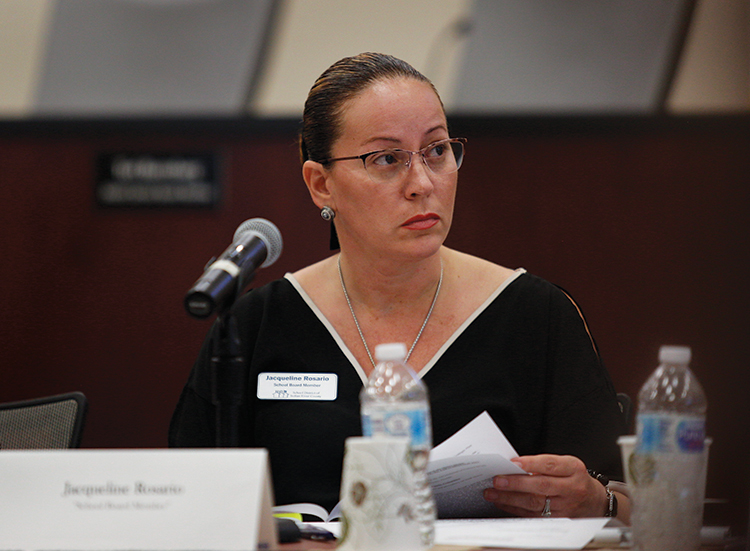
A Florida Ethics Commission attorney said School Board member Jackie Rosario didn’t violate any policies, procedures or ethical standards by using her district-provided digital calendar to schedule and keep track of political activities related to her re-election campaign.
That’s what Schools Superintendent David Moore told board members after School Board Attorney Molly Shaddock contacted the commission at the request of School Board Chair Teri Barenborg.
“The board’s attorney called and spoke to the Ethics Commission attorney strictly as a consultation – not to report anything, just to make sure we were taking the appropriate steps,” Moore said. “We were told there was no violation.
“I don’t think any further action needs to be taken.”
Moore said there was no evidence of ill intent, explaining that Rosario simply had synched her personal and work calendars, which is a common practice in the business world.
In an ironic twist, Rosario had said earlier that she did not synch her calendars.
Still, three of the other four board members said they were satisfied with Moore’s conclusion and would not forward the complaint – sent to the board by Michael Marsh, a local community activist – to the Ethics Commission.
“For this to go any further, somebody would have to file a complaint with the state Ethics Commission, and I don’t know who’s going to do it,” Board member Brian Barefoot said.
“I’m not going to do it.
“As far as I’m concerned, it was an innocent mistake,” he added. “It’s really not a big deal. Besides, based on what the commission’s attorney said, it wouldn’t go anywhere, anyway.”
Barenborg and Vice Chair Peggy Jones said they wouldn’t pursue the matter further, though both said Rosario should have contacted the Ethics Commission after the complaint became public.
“We all went through ethics training, where we were told that whenever you’re accused of an ethics violation, the determination should be made by the Ethics Commission – not the school district,” Barenborg said. “And in those situations, it’s always better to self-report, especially if you’re an elected official, so it doesn’t look like you’re trying to hide something.”
Barenborg said she never believed Rosario committed a violation, but she asked Shaddock to call the Ethics Commission “just to ease people’s minds.”
Jones said she initially wanted Moore or Shaddock to forward the complaint to the commission, “just to make sure we knew it had been reviewed” and there was no violation. But she’s comfortable with the actions taken.
“If it had been me, though,” Jones said, “I’d have reported it myself to make sure I wasn’t in violation of anything.”
Board member Mara Schiff could not be reached for comment.
When Marsh’s written complaint against Rosario was first brought to their attention, all four of the other board members said the matter should be submitted to the Ethics Commission for review.
“Any citizen can submit a complaint to the Ethics Commission,” Moore said. “Any board member can do it. Mr. Marsh can do it.”
Marsh said he “probably” wouldn’t file a complaint with the commission, claiming it would have carried “more weight” if a board member did so.
Rosario did not respond to messages requesting comment on Moore’s handling of the complaint – or the controversy surrounding the release of her calendar to accommodate Marsh’s public records request.
Moore defended his staff’s release last month of Rosario’s calendar entries, including those referring to her political activities, in response to the request, which Marsh filed in April.
Those entries prompted his complaint.
Moore said he approved the release of the calendar entries after Shaddock conferred with public-records experts at her West Palm Beach-based law firm. She was told the entries could not legally be redacted.
Rosario’s calendar entries included references to: a fundraiser; picking up petitions; submitting petitions to the Supervisor of Elections office; serving as a judge for a contest organized by a local political group; candidate vetting by another local political organization; arranging for a booth at Main Street Vero Beach’s Downtown Friday; three campaign financials sessions; and contacting a local political activist about canvassing.
Rosario objected to the release of the campaign-connected entries, arguing they should have been redacted because they were personal and not connected to school district business.
Moore, after consulting with Shaddock, initially agreed with Rosario and instructed the district’s public information officer, Cristen Maddux, to explain the error to Marsh, ask him not to share the information provided and advise him that he would receive a redacted version of the records he requested.
After Rosario voiced her complaint at last month’s School Board meeting, Shaddock contacted the public records experts at her firm. When told the political entries on the calendar should not be redacted, Moore approved the re-release of the records last week.
“There’s nothing wrong with getting a second opinion,” Moore said. “My job is to protect the board and the district as a whole, and I wanted it to be appropriately reviewed. And when it was reviewed by expert legal counsel, it came back a different way.
“At the end of the day, we didn’t provide anything to Mr. Marsh that we shouldn’t have.”
Rosario might disagree: She also complained during the board meeting that Moore’s staff initially turned over calendar entries beyond the six-month period Marsh had requested.
Moore, though, said the additional months were inadvertently included in the records released because his staff’s search of Rosario’s digital calendar turned up all entries that pertained to that six-month period.



